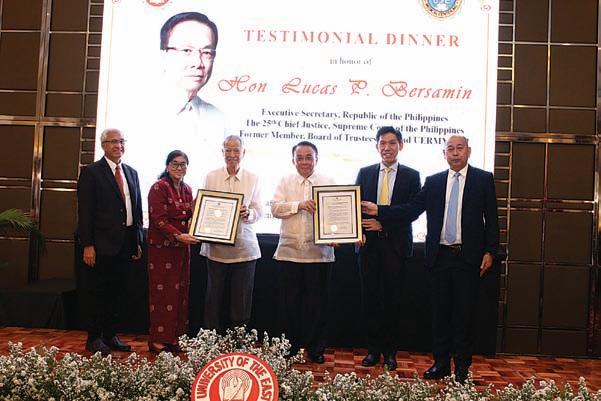
2 minute read
Equity cap still hobbling PHL investment drive, says solon
By Jovee Marie N. dela Cruz @joveemarie
DESPITE the enactment of business-friendly laws during the previous administration, foreign direct investment (FDI) inflows have not been as large as those streaming to the country’s Southeast Asian neighbors because of the Philippines’s restrictive, inward-looking Constitution, a senior lawmaker said on Sunday. The restrictive charter, he said, turns off foreign capitalists because it prohibits them from taking full control of Philippine corporations and owning lands needed for their local businesses.
C amarines Sur Rep. and National Unity Party (NUP) President LRay Villafuerte made the statement as the House Committee on Constitutional Amendments recently held its sixth public consultation on proposals to reform the 1987 Constitution.
Hence, the need for a Constitutional Convention (Con-Con) comprising duly elected delegates to work on, and clear the way to, amendments to the oft-putting economic provisions of the 1987 Charter that bar foreigners from having 100-percent control of corporations they invest in or buying lands needed for their operations because they are limited to owning or controlling a maximum 40 percent of these businesses, said Villafuerte.
V illafuerte said the Con-Con route at this early stage of the Marcos presidency is the more feasible route, in lieu of legislators conven - ing themselves into a Constituent Assembly (Con-Ass), as he asserted on TV that the House of Representatives would go ahead on this latest Charter Change (Cha-Cha)
Ore Processors Seek Clearcut Policy First
initiative even if the President said recently that amending our Constitution is not one of his administration’s priorities.
THE Philippine mining industry should first have a “clear cut” policy before it can attract investments into nickel processing, according to officials of the Department of Trade and Industry (DTI).
D TI Special Trade Representative (STR) for Philippine Trade and Investment Center (PTIC) in Tokyo, Bernardita A. Mathay told reporters at a recent virtual press briefing that none of the Japanese firms have expressed interest to go into nickel processing, noting that “the sequence should be: we have to have a clear-cut mining policy for these people to come in.”
However, Mathay revealed that five years ago, DTI had already identified firms that should be working with them to process metals into batteries.
T hese are “companies like Panasonic, et cetera, ’yun yung mga tumatanggap ng [those who accept] processed nickel products to further input that into production of the battery,” Mathay said.
So, we’re just hoping that some of these people will come in and be brought in after we have a very clear-cut policy that we announce from the relevant authorities. So right now, nobody has expressed any interest,” Mathay noted.
W hen asked on what specific clearcut policy is needed, the Trade representative said “Pag sa industry lang, gusto natin makita na lahat ng paggamitan ay hindi lang ore,” adding that technology to be used in the processing of ore for batteries for the anticipated “high demand” for electric vehicles should be included.
Mathay reported that DTI aims to stop direct sales of ore as it is a “depletable” source. Instead, she said, they only encourage new entrants that will invest in processing ore into high value-added products, which apply to nickel and copper, among others, so the country will move up the value chain.
A s for the planned move of the Trade department, DTI Assistant Secretary Glenn Peñaranda said Trade Secretary Alfredo E. Pascual “would already really strongly promote our interest to export value-added minerals especially here in the demand for minerals for battery manufacturing.”
T he Trade official said a working group led by the Board of Investments (BOI) is studying the options.
In January, Pascual said the Philippines can be a “vital partner” for the critical minerals such as nickel and copper, among others, not only as an exporter of raw ores but as a processor and producer of semifinished and finished products.
He said these minerals can be used for “downstream industries” such as EV battery manufacturing, hyperscale data centers, and renewable energy projects.
T he Philippines has Indonesia as a model, as a processor of these critical minerals, he said.
A ndrea E. San Juan








